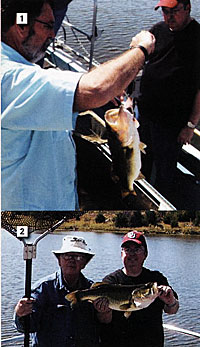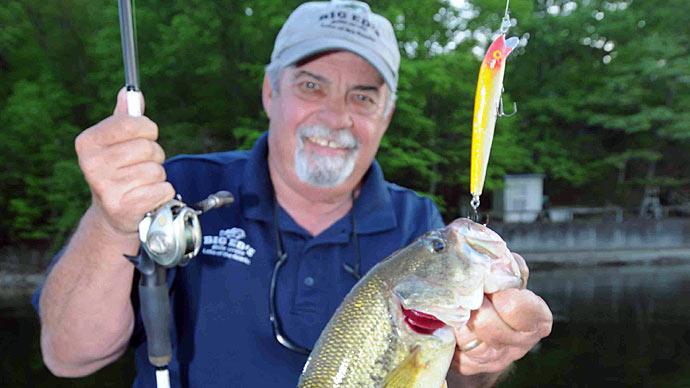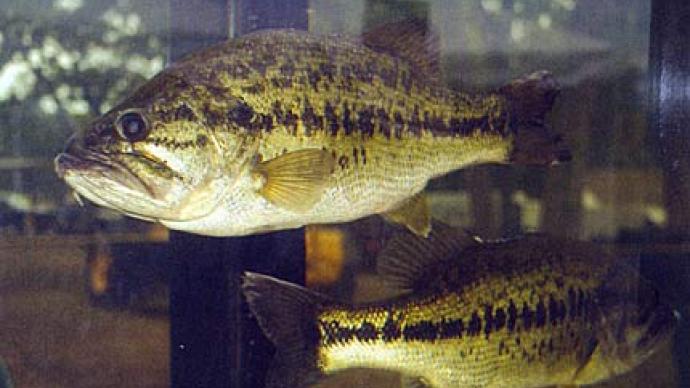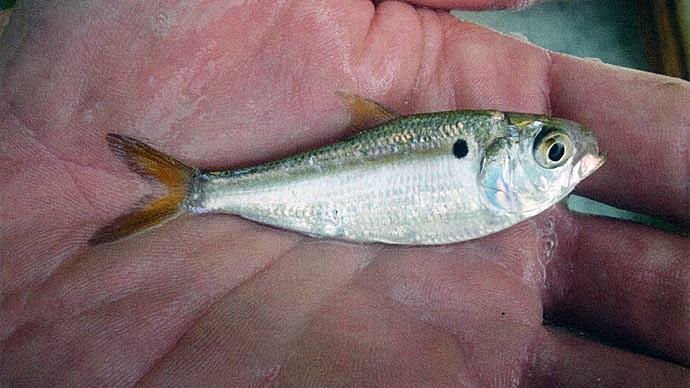
While Stacey Lobaugh's Ponca City, Oklahoma pond may not be truly considered a "mini-pond" it certainly isn't big enough to do what it is doing. As a consulting biologist, I see lots and lots of different environments. Some do, some don't. Some that do, shouldn't. Others that should, don't. It's been one of those big puzzles a biologist spends a lifetime trying to figure out.
Lobaugh has 4 ponds on his ranch northeast of the city. The premier pond covers about three acres and was built 11 years ago. He designed it to be a bass fishing pond.
It is that.
But, as humble as he tries to be, Lobaugh and his dad did everything right. Everything. Whether by design or by "a blind hog finding an acorn" as Lobaugh describes it, they fulfilled every requirement a pond needs to become as good as it possibly can be.
As we launched the electrofishing boat, my eyes began to see things which were pleasant to the mind of a fisheries biologist.
First off, I saw habitat. Perfect habitat. There was a line of native aquatic plants ringing the pond. There was chara, a little bushy pondweed and a species of potomogeton ... attractive to small baitfish. Remember, little fish become significant in the food chain if they can live long enough.
Then, just beyond the vegetation sat a ridge of rocks where the water dropped off into its depths. Perfect for largemouth bass. There was a spit, a peninsula built to deepen a shallow spot. Perfect spot for intermediate and sub-adult bass. In the middle of the lake stand two tall trees. Perfect for congregating bluegill and large bass. Along the dam was a ring of plants and gentle slope for small bass to feed.
As the electrofishing boat hummed into action, we quickly started picking up fish. I was surprised at the variety of sizes of the fish. Normally, in a pond as this, we catch a few good fish and lots of overcrowded bass with little to eat. Not here. This pond held a nice standing crop of healthy bass, well beyond 100 on the relative weight scale. We found 5 size classes of bluegill, unheard of in today's bass management, especially in an 11 year old pond that doesn't receive an ounce of supplemental feed.
We picked up redear sunfish, too. Three size classes of those cool panfish.
But, the most surprising event was black crappie. Every biologist on the planet preaches against crappie in small waters. With a sheepish grin, Lobaugh acknowledged this faux pas but called the thinking to question with a simple statement. "We catch lots of big, nice crappie each spring and we take them out."
As I thought about it, it started to make a little sense. Habitat for baitfish ... check. Superior habitat, nonetheless. Limited spawning areas for crappie... check. Congregation points for crappie in the middle of the pond, in deep water, with big bass looming... check. Harvest each spring... check. But, the biggest point to make is that for this environment, everything is harmonious. Everything.
Plants are native and healthy, not overabundant. Different size classes of different species of fish ... bass, bluegill, redear sunfish and black crappie. The habitat is exactly as it should be and because of that, the fish have responded in a positive, healthy way. The food chain is perfect and has been for many years. You can tell by looking at the random samples of fish we collected. The harvest regime is working. Genetics are good... these guys have caught two fish pushing double digits.
So, what's that got to do with you and your mini-pond? Well designed, well planned and thought out ponds can, and will, respond in Much bigger ways than some of their much larger counterparts.
Take the challenge of re-thinking your mini-pond and figure out what you can do to keep it the size it is and help it grow up ... and up.
Stacey Lobaugh and his dad did it.
So can you.
Reprinted with permission from Pond Boss Magazine



